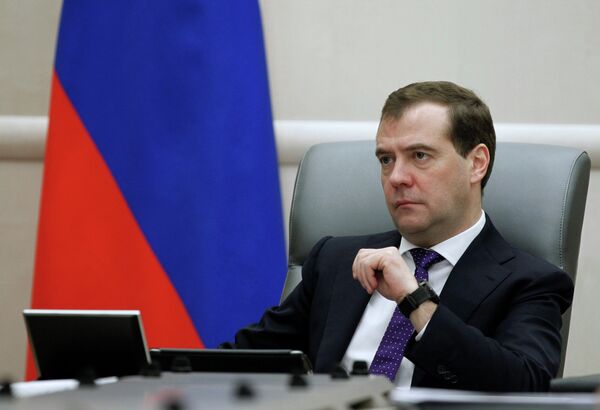MOSCOW, July 17 (RIA Novosti) – New sanctions against Russia could return relations with Russia and the countries that implement them back to the 1980s, Russian Prime Minister Dmitry Medvedev said Thursday.
Washington’s sanctions against Russia do not add any optimism for the economy or for the people, Medvedev added.
«Any sanction is evil. They don’t add any optimism for the economy or for the people and never bring any obvious success," Medvedev said during a government meeting.
“We will simply return to the ‘80s in relations with states that are introducing these sanctions," Medvedev said during a government meeting.
The Cold War period of the 1980's brought about escalated tensions between Russia and the Western Bloc, including the United States and NATO members, with the latter imposing pressure on various sectors of Russian politics and economy. The Cold War ended in 1991 with the fall of communism, following the collapse of the Berlin Wall in 1989.
On Wednesday, The US Treasury introduced a so-called Sectoral Sanctions Identification List that affects companies and institutions in defense, energy and banking sectors of the Russian economy over its the Ukrainian crisis.
Russian President Vladimir Putin said the new sanctions required a careful look but warned that they could bring the US-Russian ties to a dead end.
The United States and European Union have already imposed targeted sanctions against a number of Russian officials and companies. The list of sanctions targets has been growing since Crimea reunited with Russia in March.
The US has considerably smaller trading volumes with Russia than Europe, which allows US President Barack Obama’s administration to lobby for sanctions against key sectors of the Russian economy, while some EU member states that have close trading ties with Russia oppose the measures.
Moscow has repeatedly condemned the use of sanctions, warning of the boomerang effect such limitations can have.
Western sanctions will affect Russia’s budget policies and priorities, and its defense and security expenditures, Russian Prime Minister Dmitry Medvedev said Thursday.
"Naturally, all our social responsibilities will be fulfilled; we have enough money for it. But, in addition, we will have to pay more attention to expenditures for defense and security," he said.
«The so-called sectorial sanctions, used by US authorities against the huge number of workers in Russian enterprises in the defense industry, energy and certain banks will, unfortunately lead to further growth of anti-American and anti-European sentiments," Medvedev said.
Russia is the world’s third-largest spender on defense, which is forecast to grow 13.5 percent in real terms this year, according to industry-specific analytics of the IHS Quarterly journal. Since 2007, Russia has more than doubled its defense budget in nominal terms, overtaking the UK and Japan, and will have it tripled by 2016.
Together with China, Russia compensates for Western cuts on defense spending and contributes to the expected 0.6 percent global increase in defense spending this year — a recovery from a fall in the early 2010s, according to IHS.



